D&D's upcoming virtual tabletop radiates a big-budget misunderstanding of what matters in role-playing games
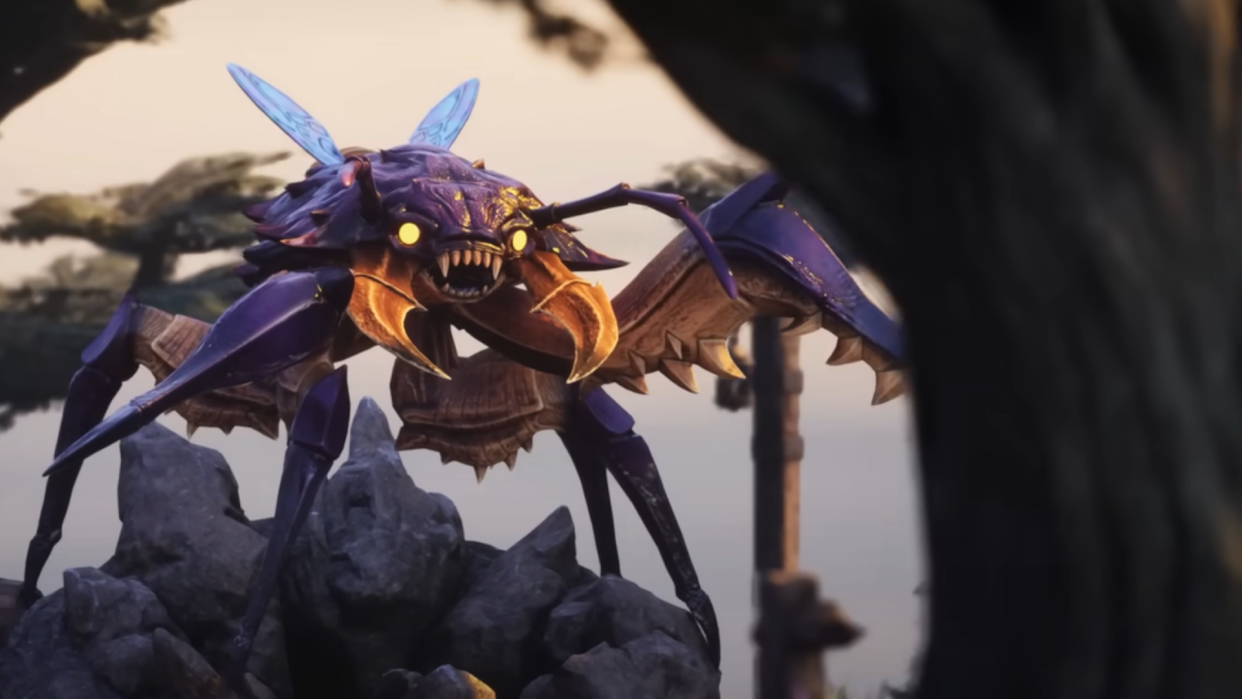
Update: At a creator summit earlier in the year, Jeremy Crawford revealed that "One D&D" was intended to be a placeholder name. I've updated the article to reflect this.
I think Baldur's Gate 3 is gonna be great. Larian Studios have taken the right attitude toward adapting Dungeons and Dragons' 5th edition ruleset—the tabletop game's system forms the backbone, sure, but it's still been built as a killer CRPG first and foremost, with its own story, identity, and campaign. Larian knows it's building a videogame, and they aren't trying to replace anything.
Meanwhile in tabletop land, One D&D looks confused by comparison. For the uninitiated, One D&D is a large-scale retooling of Dungeons & Dragons, reminiscent of the current 5th Edition system Baldur's Gate 3 is built upon, but with huge updates to class structure, spells, rules, and more. While One D&D was a placeholder name, its moniker's not yet been replaced with anything other than "the 2024 rules update" or, more confusingly, just "5th Edition". This makes it a little hard to talk about, so for the sake of this piece, I'll keep with the codename.
It's also coming with its own bespoke virtual tabletop experience, a flashy, big budget platform with 3D miniatures, spell animations, and more. It's meant to be a new digital way to play the pen-and-paper RPG—not a videogame, though you'd be forgiven if you mistook it for one. Personally, I couldn't be less interested.
A historic fuck-up with its open game license earlier this year seemed like an attempt to limit what its competitors could do in the space. Now that's been walked back, I'm still left head-scratching at the concept's bones. The tabletop looks pretty slick as we said recently, sure, but what's the bloody point?
Before stepping up on this little soapbox, I want to highlight two virtual tabletops that are currently pretty popular—Roll20 and Foundry. While our Robin Valentine's thrown together a list of his favourites, I'm going to lay out why these two programs jive with the way I play D&D, far more than One D&D's proposed digital wonderland.
Roll20—my dice, bread and butter
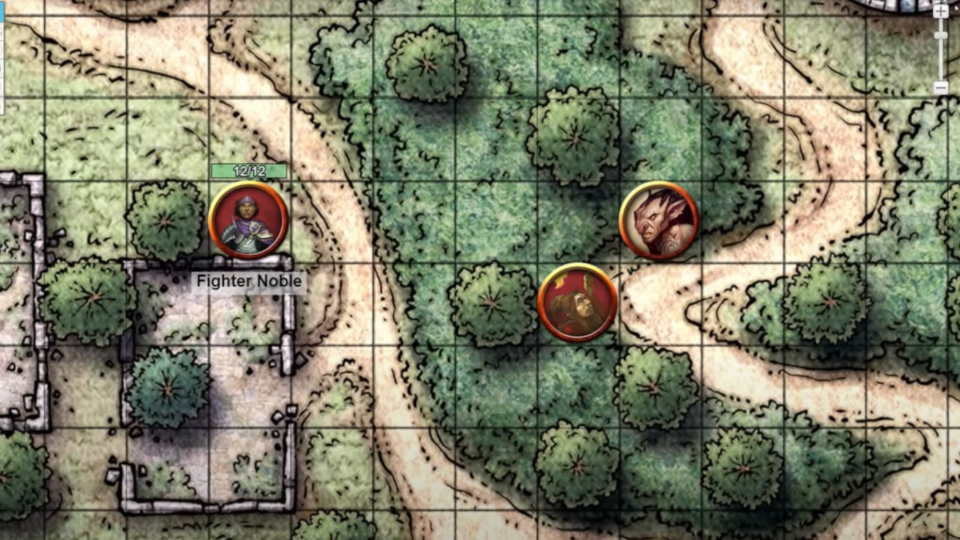
It's a common rule when writing horror that you should rarely show the monster, because your brain often does a better job at frightening itself. Tabletop games like Dungeons & Dragons are powered by a similar idea. Our imaginations are great at conjuring up a magical world wholecloth.
Looking at One D&D's glitzy rendered backdrops and virtual minis—cool as they are—fills me with a deep kind of sadness. Especially whenever the camera pulls back to reveal its players staring at a set of laptops, despite sitting right next to each other.
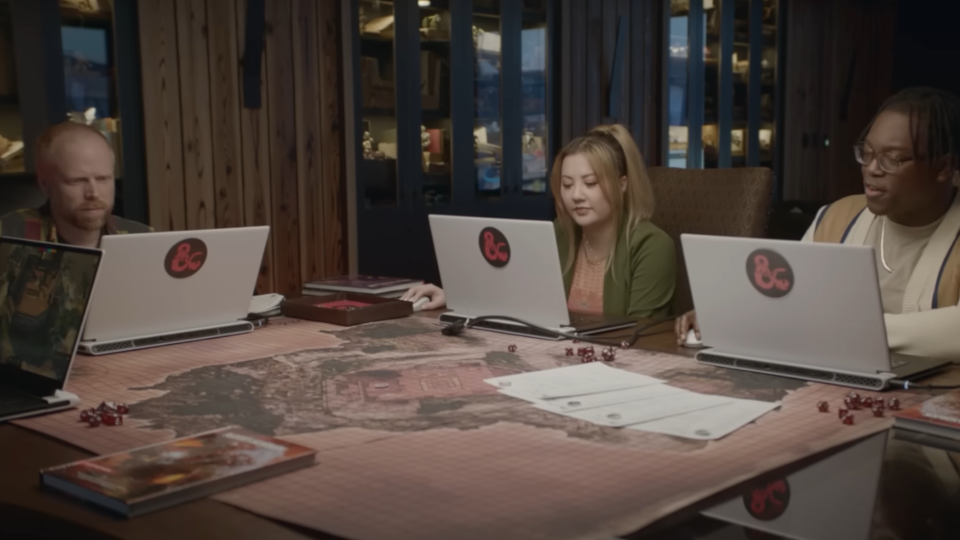
I've stood atop the grand spires of the Dragonborn's cliffside home, onyx pillars jutting high above a roiling sea. I've sat in the cabin of a steam train while it's rolled along a desert, the turbines of distant wind farms turning in the arid breeze. I've adventured through a mythological parchment-land scrawled by a god where I met a warrior atop an origami steed. I experienced all this in my mind's eye. These places feel real not because they were rendered in front of me, but because I went to them in my brain, with my friends.
The power of this imagination is why I use Roll20 as my primary platform. You can delve right into its guts and tinker with it, certainly, and its marketplace is filled with assets. I use it because it works basically right out of the box—if you want to hunt down the glossiest jpeg for your battlemap and create lore-accurate condition markers, great. If not, you can get a game ready to go in like an hour.
It provides the digital equivalent of a dry erase board, with an ample box of bells and whistles to tie to that board at-will. As a DM, I just can't imagine ever fiddling around with fully-rendered 3D environments when I could scribble out a quick map, slap it under a grid, and let my group's shared imagination do the rest. To me, the power in that meeting of the mind's far more appealing.
Foundry, a tinkerer's paradise
While I'm sure there are some real Roll20 sorcerers out there, I've personally always been real impressed by Foundry's modularity. I'm not a tinkerer sort of DM, but I've seen it become a tinkerer's paradise for a friend's games: which is why a particular quote from One D&D's reveal trailer has been bothering me ever since its debut.
While describing their VTT, the One D&D team makes a promise to "take care of the lazy DM". DMs take shortcuts, for sure, but I don't know if I've met a single DM who I'd actually describe as lazy. We're obsessive tinkerers, fleshing out entire worlds and tailor-fitting our games to our groups.
We might slack in certain places, but every DM has one area they're feverishly devoted to. As previously mentioned, I don't go in for high-tech visual aids. I have, however, spent hours building up custom WorldAnvil websites, fleshing out NPCs, regions, and cultures. Foundry isn't for me, but my friend—a DM for a game I play in—swears by it.
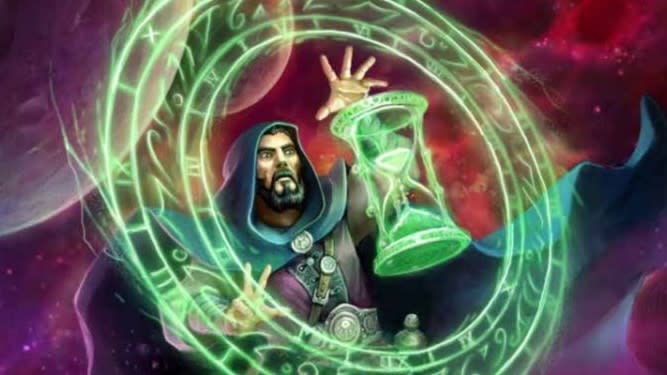
This DM has spent an absurd amount of time in Foundry tinkering with mods, custom character sheets, and animations. Recently he even developed an entire PS2-style menu system, a living book replete with paper-folie sound effects each time you turn a page. It rules.
He loves Foundry because it provides tools to back up a DM's imagination instead of replacing it. It's a wonky collage of mods, assets, and art he's collected to fit with his picture of the world, and it's heavy lifting he's been happy to do.
Wizards is promising a degree of modularity with One D&D's VTT, saying we can pull apart and reassemble the campaign modules they give us. But I'm majorly sceptical that an officially-sanctioned project will even hold a candle to Foundry's punk workshop feel. I get the dread feeling we'll be slapping together digital Legos, rather than conjuring our own brew.
A botched initiative roll
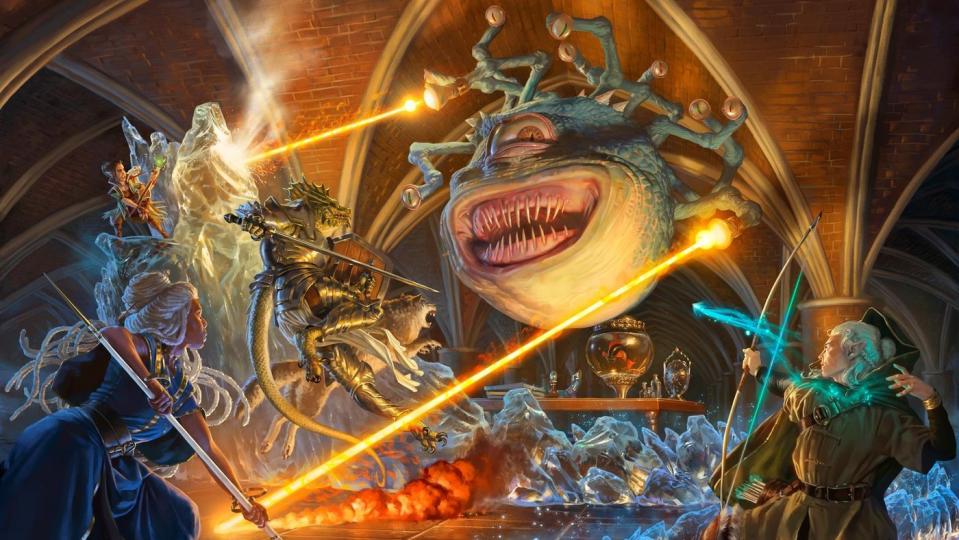
I can't help but be reminded of the differences between the floundering "metaverse" attempts from companies like Meta—clean, dull—and the more anarchic VRChat where Winnie the Pooh can watch while you get a baptism from a licensed priest. I swear this'll make sense in a second.
OneD&D looks like it wants to offer a tailored, high-fidelity experience. Much like VRChat, however, virtual tabletops that've done well are decisively weird and collaborative and communal. They're workshops rather than theme parks. Instead of providing a "digital experience", they serve as ways for people to build up that experience for themselves.
A glitzy 3D cage not only robs people of the opportunity to use their imagination, it's also far harder to 'hack' than other options out there, making it inherently restrictive by design. Not to mention: you can use VTTs like Roll20 and Foundry to play other systems, something I highly recommend even as a major D&D devotee myself.
Maybe I'll be proven wrong, and OneD&D's high-fidelity miniatures sim will blow my socks off. Speaking as a long-time TTRPG player, however, the hyped-up "digital experience" doesn't look all that enthralling to me. I've got a perfectly good graphics engine right behind my eyes, thank you very much, and no open games licence meddling can stop me from rotating a beholder in my mind whenever I want.

